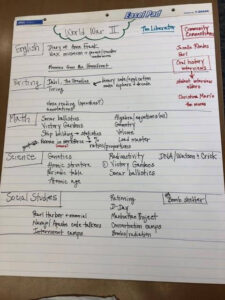
On December 7, Pearl Harbor Day, I had the honor of visiting teachers at Miami Junior High in the Miami-Globe area. We picked the date because Miami teachers are redesigning their curriculum with the upcoming quarter organized around World War II. Seventh and eighth grade students will learn about WWII in all their core content classes. Rather than studying a series of topics a mile wide and an inch deep, they dig a mile deep into learning about WWII.

As a gardener, I can tell you that staying at the surface of things doesn’t serve our plants well, and the same of our children. Students at Miami Junior High are getting the chance to grow deep roots.
When principal Glen Lineberry introduced this curricular approach last summer, he did so hoping the new way of learning would increase student engagement. Junior high students at the school had previously showed little enthusiasm for learning and had difficulty making connections between classes. Like many junior high and high school students, the separation of the subject areas led to separation of thinking: English, social studies, science, math. Students saw what they learned as isolated concepts in isolated periods of the day.
By teaching content thematically, students have begun to see connections all around them. Prior knowledge of a topic has an enormous impact on a student’s ability to learn new concepts, and a thematic approach supports ongoing development of important prior knowledge. Students’ prior knowledge, in this case about World War II, continues to grow and strengthen, giving new learning a place to take root.
And just like in the garden, deeper roots mean better outcomes and long-term growth for plants. I mean, students.
An unexpected benefit of all this has been the impact on teachers. While the thematic teaching concept was initially scary and unfamiliar, the closely-knit team of junior high teachers tackled the challenge. On their journey, their own passions for learning have been reignited, and they have a developed a renewed enthusiasm for teaching. One teacher told me, “I didn’t even know I was burnt out. This has reinvigorated me.”
Teachers and students in rural Miami will continue to explore and grow together. Creating all-new curriculum is challenging and time-consuming, and new ideas need time to take hold. But just like that seedling in the garden, with sunlight and water, they will thrive. I look forward to visiting their garden a year from now.